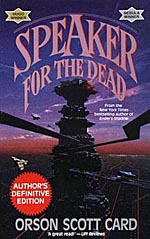
![]() jfrantz
jfrantz
10/14/2012
![]()
When Speaker for the dead resumes Ender's story, it is 3000 years later and he has continued to fill the role of speaker for the dead that he began at the conclusion of Ender's Game. Flitting about the Hundred Worlds at near relativistic speeds, he hasn't aged much and he still struggles to atone for the monstrous act he committed against the Buggers. But now, on the world of Lusitania, Ender may have found the perfect planet--the only planet really--where he can release the Hive Queen. But before he can do that, he'll have to deal with yet another sentient alien race, the "Piggies".
"This is the real book"
According to the author himself, this is the book that Orson Scott Card wanted to write. After a fairly successful running of Ender's Gameas a novelette, he was given the opportunity to write a sequel of sorts. In the afterwards to the audiobooks for both Ender and Speaker, he said that while he was happy with the success of Ender's Game, he never intended to write it (as a full length novel). In fact, he said that when he sat down to write what would have essentially been the sequel to the Ender novelette, that it was the longer novel version that came out instead, and thus did one book become two. Well, obviously Ender-the-novel received even greater success than the novelette, but according to Card, it wasn't until he finally got around to Speaker for the Dead that he was able to write the novel that he had always intended.
Apparently, after an experience while on a mission in Brazil, he had come up with the idea to write a story about what it would be like if we actually told the truth about really bad people when they died. Thence, he tells us, came Speaker for the Dead.
While Speaker was ostensibly a continuation of Ender's story, Card's writing was anything but a continuation of what he began in Ender's Game. In Speaker, Card's style feels/reads a lot more like one of Asimov's Foundation novels with its excruciatingly twisted plot which is only uncovered piece by piece by copious philosophical, deliberative and wonderfully intense dialogue.
As different as the writing, story and characters were, and as much time as has transpired between Ender's Game and Speaker for the Dead, they really shouldn't have been two novels. I found it funny that Card would take the time to explain, twice, that "this is the real book", when in fact it's not so different from Ender's Game. It felt like the Red Delicious Apple syndrome. If you have to tell people it's great, is it...really? I mean, I readily admit that it was Ender's struggle with his two selves and humanity's regret and remorse after having exterminated the Buggers that most fascinated me, and that I still enjoyed Speaker for the Dead quite thoroughly. I just feel like he should have written it as one (longer) book because it didn't really cover much ground that wasn't begun in Ender's Game. Given that trying to write speaker, Card accidentally wrote a longer version of Ender's Game, it seems like his writing brain might have agreed with me.
Recommendation
This is a funny book when considered along with Ender's Game. As great as it was, I also feel kind of...meh...about it. Yes, there were some great moments, but as a stand-alone novel, I'm not sure that it works. Much of the Ender's tension relies heavily on events from the first novel and although the Piggies were an interesting attempt to give this novel a life of its own, it seems to me that it would only work for those who really want a "deep set" (ahh! Cyteen is still controlling my brain!) on Ender's moral and psychological journey. But then, apparently many people did as it won the Hugo, Nebula and Locus SF Awards!
http://hugoenduranceproject.blogspot.com/2012/10/speaker-for-dead.html